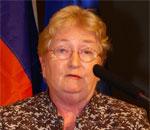Patient safety going in the right direction

On 23 September last, the great and the good of Irish healthcare gathered to launch a new Patient Safety First initiative. Is this another puff launch or can it make a real difference to safe patient care? By Sara Burke.
First let's look at our very poor track record in patient safety. High profile cases that come to mind are:
- Michael Neary's unnecessary removal of hundreds of women's wombs
- The cancer misdiagnosis scandals, in particular Rebecca O'Malley who bravely spoke out about her own experience
- The recent case in front of the medical council of a surgeon removing the wrong kidney from a child
Those are the high profile cases. But it is quite common to have what is known in the medical professions as 'adverse events'. We don't have good information on the extent of adverse events in an Irish context but there is good international data which shows that one in ten people who go into hospital have an 'adverse incident'. We know that 10% of hospital care is spent looking after them and it is estimated that 98,000 deaths are related to 'adverse events'.
About half of the adverse events are related to getting the wrong medication. In surgery, a lot of problems actually happen in the operating theatre. In the past, unsafe blood products were a significant cause, also delayed diagnosis resulting from incomplete patient history or poor handover of care from one clinician to another. We know that it's safer if people work in teams than as sole practitioners. We know it's safer if incidents are reported and not covered up.
How to stop adverse events is a growing area of knowledge. Human beings are fallible; people will always make mistakes and we can't change the human condition but we can change the conditions in which humans work. So it's about minimising the risk and learning from those mistakes when they do happen.
For example, now in most operating theatres they use check lists – and this is applying the knowledge from areas such as airline and food safety to a medical environment. So when a pilot gets on a plane, she meets her fellow staff, and has to fill out a check list so that everything is ready for flight – at the end of the flight she does the same thing.
Passengers have to listen to safety messages every time they get on a flight but this is about doing the same thing each time and this is about safety. Many of those rules can be applied to health care. If check list and safety procedures were in place, that child's kidney may not have been wrongly removed.
Also, in terms of medication we are learning all the time. Recently, they piloted an initiative in St James' of not interrupting nurses during drug rounds and they found significant improved results. Standardising drug charts and prescription forms also improves outcomes.
Lots of what was talked about at the patient safety launch was licensing, protocols, guidelines, audits, benchmarks and training – all sorts of jargon which sounds very dull but they are about putting those airline-like systems in place which are very important.
In the case of the child who had the wrong organ removed that was recently in front of the Medical Council, it emerged that the boy's mother repeatedly stated concerns about which side the surgery was on yet the mistake was still made.
There was an acknowledgement from many medics that they weren't always the best listeners, that the patient and their carers can bring a very different perspective to the table and the need for patients to be listened to and heard.
Mary Harney has made a point of appointing lay people to the medical council and patient safety commission. She has ensured that people like Rebecca O'Malley and Margaret Murphy are involved in various groups and projects which are developing all these patient safety programmes.
Margaret Murphy (pictured) whose son died as a result of an adverse incident 11 years ago launched the HSE's new patient charter. She is a very inspirational woman and she felt that today we were drawing a line in the sand in terms of improving patient safety. She quoted the mantra of Liam Donaldson, ex Chief Medical Officer in England, – 'to err is human, to cover up is unforgivable, to refuse to learn is inexcusable'.
Health services today are no safer than they were yesterday on the basis of this Patient Safety First launch. The launch was a good example of how slowly the wheels of state turn, but the wheels are turning in the right direction and the Patient Safety First launch was important because it brought together many of those strands which will lead to safer patient care.
And is it possible to do all this with less money? Mary Harney spoke about this and her line was we cannot afford not to – at the moment adverse events are causing harm, losing lives and costing money and not improving patient safety costs more than improving it....
